Foreword
Hey hey people, (the) Mikky here, back to my usual naughtiness. This time it should be a relatively short post, where I try to make a relatively simple point - that absolute risk of covid is not that great for the individual.
I'm far behind the narrative, to be honest - we're no longer "endangering ourselves", we're now a threat to society. As with most baseless accusations, it is impossible to disprove because the accusation is the assumption.
Anyway, let's do some risk/benefit analyses. As always, welcome to skip to the conclusions if you're short on time or patience to deal with my bullshit.
Definition: Absolute risk vs Relative risk
We've heard all about the 95% (alleged) vaccine efficacy. No doubt an impressive number. However, one should also take into account the initial risk before vaccination. For example, ebola supposedly has a 25–90% mortality (wiki). A 95% effective vaccine would reduce this to 1.25-4.5%. Good stuff!
However, I'm not rushing to get an ebola vaccine, despite really, really, really not wanting to get infected. Why this contradictory and illogical decision?
Simple - the absolute risk of me catching ebola in the first place, is close to nill (at least, where I live). Whenever you calculate risk/benefit you should also take into account what the absolute risk is.
Should you insure your house against earthquakes? If you live in Japan, sure. Not really worth it if you live in most of Africa, Canada, Europe, Россия, Brazil, etc... you get the point.
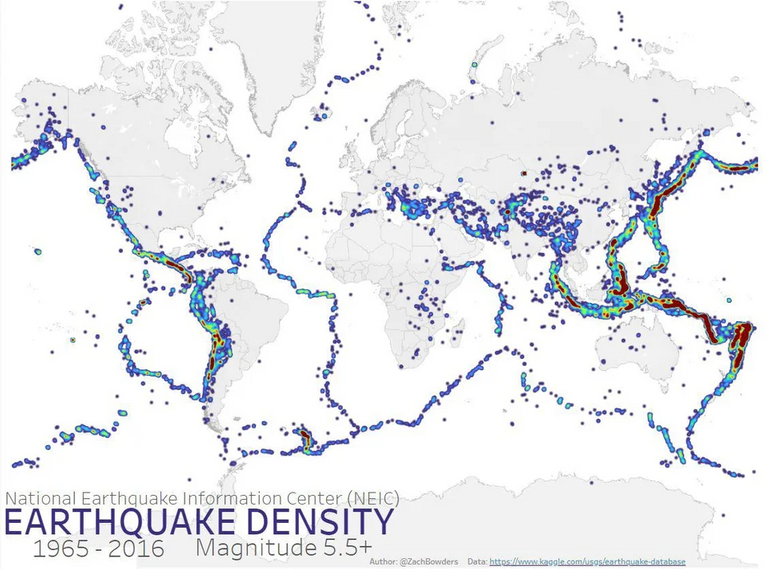
So when you read the amazing protection that the vaccine gives, keep in mind what your absolute risk currently is. If you watch the news, you'd think the WuFlu's right around the corner and if you haven't caught it yet, you're one of the luckiest bastards alive.
Meet the data
In its raw form, it's time-series data.
In this graph, we see the number of positive cases a day, normalized per population sizes. Now, I don't care about any particular time period - I'm going to sum it all up, and as the data is normalized, this will get me the total risk of infection over the time period. Which by the way, is from 17 January 2021 to now (2 December 2021). Cool.

The data is also divided into 2 basic age categories - those above 60, those below 60, and the general population (all normalized to their respective population sizes).
Caveats
- Like I said, data starts from Jan 2021. I am missing half of the 3rd wave and the entirety of the 1st and 2nd waves.
- Age groups are ridiculously loose
0-60 are placed under the same category. Because Israel has a metric fuckton of kids, this means that the numbers are HEAVILY skewed for their population. However, they are also the majority of our covid cases, so maybe it balances out. Still, important to keep this in mind. - This is Israeli data only.
I cannot speak for covid in your area, or how the risk analysis changes by your location. However, considering that we're testing up the ass, I highly doubt there's a significant # of missed cases (if anything, there's less than reported but that's another post) - No mention of treatment (or lack thereof)
A no-brainer, but simply data I don't have. So I'm going to assume that all the severe cases got hospital care. Make of that what you wish...
OK, that seems to be the brunt of it. Let's see some risks!
The total risk graph for (most of) 2021
What's my risk of catching covid throughout 2021
Reminder that there were 2 heavy waves that hit us. So what's the chance if you picked someone at random and they got covid?
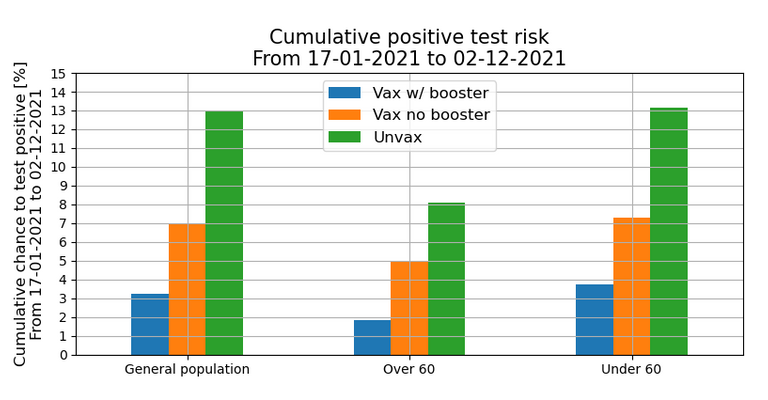
About 13% in the general or under 60 population. That's quite a bit, but I should also add that an overwhelming amount of our cases were kids:
- Note that here % are of total cases reported, NOT % of the population.
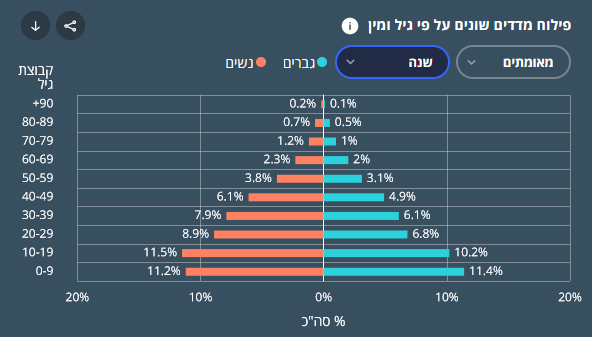
OK, that's enough to claim that it's a pandemic... well, as far as positive cases are concerned.
But we don't care about becoming a positive case.
What's my risk of getting a serious case of covid?
Here is where most analyses show you the risk of deteriorating into serious illness once you catch the bug. Here it is, I won't go in-depth here. I think that the fact that you can barely see the under 60 numbers tells everything you need to know.
- I should note that for the elderly (>60), the risk is significantly higher. Do your own due diligence on the matter.
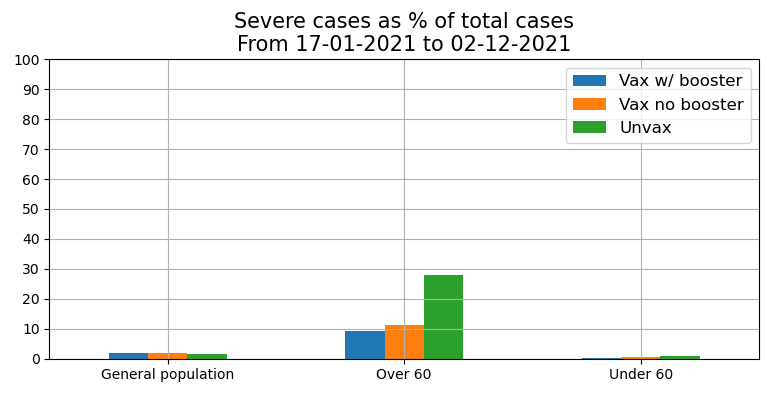
Now for what I really wanted: absolute risk of serious covid, taking into account that you may not get the damn thing!
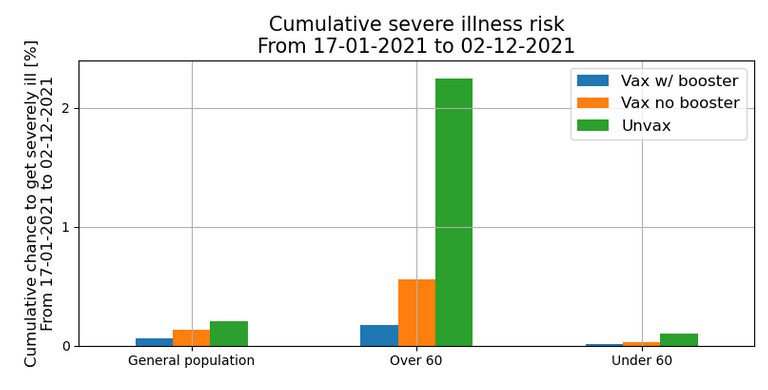
Yes, great job on the vaccinated for lowering their risk significantly (blue bar is far lower than the green bar).
However, if you're under 60 - your risk of getting serious covid throughout 2021 was ... squints eyes ... 0.1%? Remember that this includes 40, 50 + year olds. As a 28 year old guy my number would be even smaller. To reduce a 0.1% risk to say, 0.01%... eh. I'm not rushing to the vax clinic.
What's my risk of dying of covid ?
Death, though definite, is hardly a good definition of severity. None of us want to survive and be left with life-long injuries, or even suffer immensely as our bodies rot and hurt in front of our eyes. Nevertheless, it is the ultimate price to pay, and the question is - how high is this risk?
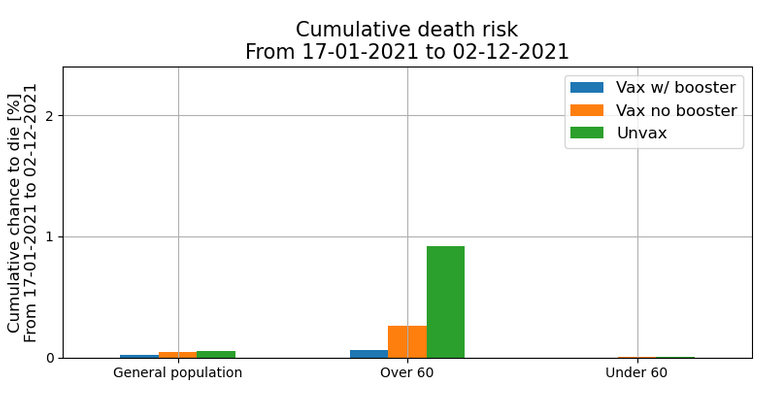
According to these data, we lost almost 1% of unvaccinated elderly throughout 2021. Nothing to be happy about, but it is also the only significant number to pull here, I feel. I can't even see the risk of dying of covid if you're under 60.
Conclusions
If covid keeps up at this pace, it's very likely we will all catch it sooner or later - at an approximate yearly rate of ~13% of the unvaccinated population and ~3% for the fully vaccinated. That is, if herd immunity doesn't whoop it before that.
However, your risk of getting severely ill from covid? Minuscule. If 2021 is a good benchmark, I run a yearly risk of ~0.1% for serious illness as an unvaccinated under 60 year old. This means that say, over 20 years my risk of getting serious illness from covid will be ~2%. That's more than enough time for me to see the effects of the vaccine and decide as I enter my 50s whether it's the right decision for me.
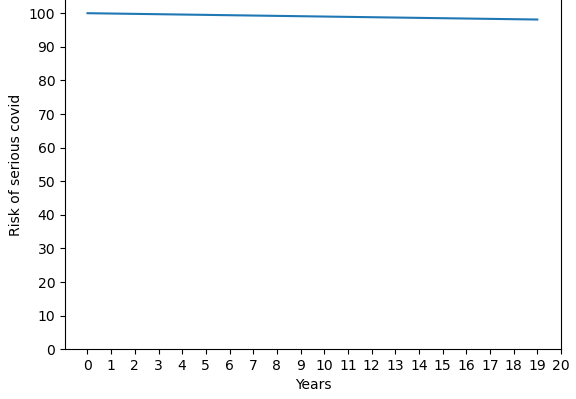
This is not to encourage people to be reckless, or discourage people from vaccination if they feel that their personal risk is higher.
This is to point out that statistically speaking, you're very, very likely to be fine (at least, under-60s). My advice would be to try any number of treatment and prophylactic options if you're worried. Personal disclosure: I take 1000 IU of Vitamin D every day, and have Hydroxychloroquine and Ivermectin at hand if needed.
Bonus graph - per-age risk distribution
Since I already know you hit that 100%, I'll be extra nice:
Here's the risk of getting severe covid, assuming you got it already by age and sex. I don't recommend comparing it to the previous graph because I simply divided the total # of serious cases since the start of corona by the total # of cases (per age/sex group).
Oddly enough, my age group (20-29 males) gets 0.2% risk all of a sudden - and that's assuming you caught the virus! I can't tell where the discrepancy between the two data lie, especially since the comparison is unfair (0-60 vs 20-29... who knows how much that skews the #?)
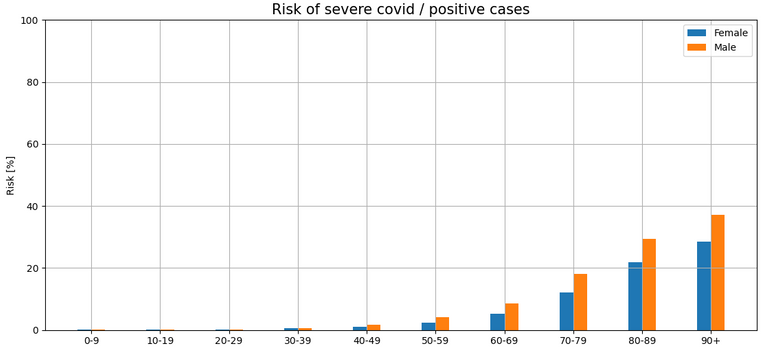
Anyway, stay safe, stay great, you're all truly wonderful.
Source
Positive cases, severe cases, and deaths normalized per 100k (all covid)https://datadashboard.health.gov.il/COVID-19/
The rewards earned on this comment will go directly to the person sharing the post on Twitter as long as they are registered with @poshtoken. Sign up at https://hiveposh.com.
Good information is so hard to come by, this all makes sense to me. Would love for @normanfenton to read this too.
Shared on Twitter #POSH
At low chances, there are severe symptoms and death, which obviously are not good outcomes. At higher chances seem to be less severe but long-term systemic effects, and I'm particularly concerned about cognitive impairment. Studies show a measurable overall impact in people who have seemingly recovered from the virus.
Long covid is a bitch, truly. I know of one person who suffers heavily from it, and another who has a persistent cough but is otherwise fine.
However, I simply lack the data to analyze this myself (if you have data, please share!).
I've seen studies claiming that 30% of "light" recoveries develop long covid, symptoms of which range from the neurological to the cardiac to mental health issues ... just about anything except cancer.
Something just smells off to me about the really wide-spread range and high occurrence of symptoms.
Note: I'm NOT a medical expert. Maybe this is not as abnormal as I think it is.
But anecdotally, for example:
Israel has had ~1.3 million cases since the start of the pandemic, or ~14% of the population. I find it hard to believe that we have ~400k (~4.2%) long covid haulers with severe impact to their health and yet VERY few people seem to know anyone who's had long-lasting effects.
In comparison, almost everyone here seems to know a family who lost a son to war, despite statistically this being a very rare occurrence.
I'm fully aware that this is definitely not a scientific approach, but it's what I have. If long covid was truly that common, it would be impossible to ignore.
I'm not downplaying its severity - but the situation on the ground doesn't match what the studies show.
P.S. I have no idea why in that meta-analysis they added the Swiss study that looked at patients "5.5 ± 2.4 days post ICU discharge". I can't imagine returning to proper cognitive function a week after being discharged from the ICU for any reason. The other studies involved seem to be decent (at a glance), however.
I was cognitively impaired for at least 2 weeks after breaking my ankle and being at home on opiates for 3 days.
Thanks for confirming! I vaguely remember that some of the studies looked over longer periods of time, but this just further proves that the Swiss study is hot air
I just got done watching Dopesick (about Oxycontin) which is essential viewing btw...
It made me look in my cupboard because I remember being given opiates after the rebuild of my ankle with a titanium insert. I found that I'd been given 20x5mg of Oxycodone which is functionally the same but without the slow release feature. I took only 11 pills out of the 20 I was given because I know that stuff is bad news and switched myself to over the counter pills.
Anyone in ICU is probably going to receive something that messes with their head in a significant way...
I just looked at that study! 100% mechanical ventilation!!! That means complete sedation for days!!! I can't imagine anyone being impaired 5.5 days after surviving that.
Guess I'll have to check it out. I've heard a lot about the opioid crisis to know to stay away. My dad was given opioids against his will (so I understood) and I don't understand how he's OK with it in retrospect.
I agree entirely, that and the Brazilian study both had 100% mechanical ventilation (some other studies had 50, 30% etc) but I see that their numbers aren't TOO high compared to the rest. So in theory, they shouldn't skew the results too much, but it's still a travesty that these studies got pooled in.
I really have to sit down and go over the meta-analysis properly, maybe they divided long covid outcomes dependent on how severe the covid was to begin with and I just missed it.
Would be interesting to see the data from Israel in conjunction with data around Vitamin D levels.
Ha, good luck finding Vitamin D en masse... however, I do have a treat for you (Israeli study too!):
https://www.medrxiv.org/content/10.1101/2021.06.04.21258358v1.full.pdf
The TL;DR of it is this:
So long as your Vit-D is above 20, you're a lot more protected.

HOWEVER:
Vitamin D deficiency was associated with ...
comorbidities including COPD (Chronic obstructive pulmonary disease) (p=0.006),
diabetes (p=0.026),
and hypertension (p =0.016)
In other words, people with low Vit-D levels were fucked to begin with.
The optimist in me wants to believe that low Vit-D levels are responsible for general system vulnerability - the easy solution then, is to get more Vit-D.
The scientist/realist in me understands that most likely, we're talking about people with an unhealthy background, which expresses itself in many ways, including low Vit-D.
Thanks for finding the data, reading through the pdf now. In Israel which is a warm and normally sunny climate I'd assume have higher levels of Vitamin D among the population than let's say England which led me to bring this up. So what I was getting at is could this be skewing the figures.
And the worst Vitamin D levels are in racial minorities living outside their home latitudes where skin colour drastically affects natural levels.
Also plenty of evidence that over 60 the natural creation of Vitamin D really drops off. I have my parents here in Israel supplementing quite a bit.
You'd think so, wouldn't you??
Apparently we've for the most part become so Westernised that we stay indoors most of the time, so the sun's there, we're just not taking it in.
I've also heard claims that Vit D takes time to absorb after exposure - that showering up to 24h (or 48?) after being in the sun reduces intake by a lot. Let's just say people aren't walking around soaking up sunrays and then not hitting the showers here.
But this is just stuff I've heard, I can't vouch for any of the claims.